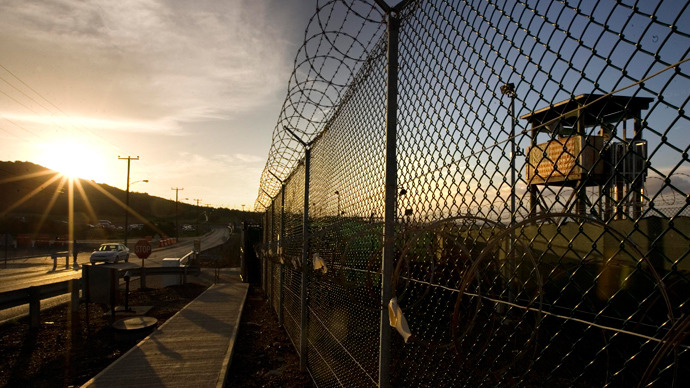Obama ‘prefers Guantanamo status quo’

The deteriorating situation in Guantanamo - where a mass hunger strike has been unfolding for over two months - continues to raise the eyebrows of human rights groups. Prominent activist Medea Benjamin discusses with RT why the prison is still not closed.
Twenty-four hunger strikers are now receiving enteral feeds, with three people "being observed in the detainee hospital," according to Guantanamo Bay Public Affairs Director Lieutenant Colonel Samuel E. House. His most recent report put the official number of hunger strikers at 100.
Although Guantanamo Bay remains open over four years after Obama pledged to close it, the President continues to voice his disapproval of the detention center.
In his first public response to the ongoing hunger strike, Obama said it was "not a surprise" that there are "problems in Guantanamo."
"It is critical for us to understand that Guantanamo is not necessary to keep America safe. It is expensive. It is inefficient. It hurts us in terms of our international standing. It lessens cooperation with our allies on counterterrorism efforts. It is a recruitment tool for extremists. It needs to be closed,” he said in an April 30 statement.
The next day, Obama announced that he was considering hiring a new State Department official to oversee options for a future transfer of the prison’s detainees once it closes.

Earlier this month it has been revealed that keeping Guantanamo Bay running is costing the US some $150 million a year.
Medea Benjamin, author of the book “Drone Warfare," shared her thoughts with RT on why the Obama never kept his promise to shut down the notorious detention facility.
RT:President Obama pledged to close Guantanamo when he assumed office in 2009. But over four years later, it’s still open. Why?
Medea Benjamin: People around the world are saying if the President of the United States says the prison should be closed, why is it still open? That’s a very logical question to ask. I think that the politics in the US is so partisan that the President is concerned already about who is going to be running in the next presidential election as the democratic candidate, the Congressional elections, wanting to make sure that as many democrats as possible win. The President doesn’t want to be seen as soft, and national security issues. He doesn’t think the American people care enough about this issue. And so he prefers to keep the status quo. The status quo means that desperate men are dying and are being tortured by being force-fed. That is not a status quo that we, the American people, should allow, if we want to continue to call ourselves a democracy.
RT:The prisoners' hunger strike has been going on for over two months now, but there's very little information coming from most media outlets. So what's really going on there now?

MB: The prisoners who have had a chance to get messages out to their lawyers have described the terrible situation that they are in being strapped down for several hours having these tubes stuffed down the nose and into their stomach. They say it feels like a razor going down their bodies. This is another form of torture, and these prisoners have already endured years of torture in Guantanamo.
RT:The hunger strike doesn't seem to be obtaining the prisoners' goals, especially since you mention they are being force-fed. So why are they continuing to starve themselves?
MB: I think these inmates, or prisoners, as really what we should call them, are desperate and many of them are determined just to keep the hunger strike going. It’s difficult for them, because some of them are in isolation and they don’t know if other prisoners are continuing the hunger strike; are they being told that the other prisoners had stopped the hunger strike? I’m sure it’s a tremendous dilemma for them. But a number of those who have been able to speak through their lawyers have said they would rather die than live in these terrible conditions without ever knowing if they are going to be released.
RT:President Obama says he still believes the prison should be closed. Do you think he was sincere in his statement last month? Does he have the power to do more than he is?
MB: Obama is lacking the moral courage, he’s lacking the political will, he blames Congress, but really he has the power to release those prisoners who have already been cleared for release; demand a speedy and fair trial for the other ones and bring them into the US and close down the shameful prison of Guantanamo. We just have to force him to do it. We, the American people, the global community.

RT:What should be done with the prisoners in the unlikely event that Guantanamo is shut down sometime in the near future?
MB: One is to take the majority of prisoners, 86 of them, who have already been cleared by the US government – that means they have been found not to be guilty, not to be harmful to anybody – they should be released. The majority of them are from Yemen. The government of Yemen says they are totally prepared to take them back. There are other prisoners from countries like the United Kingdom that could certainly handle the return of prisoners. So those cleared for release should be released. The others should be sent to a prison in the US and should be tried in US courts just as other criminals are tried, many of them convicted and sentenced to life in prison.
The statements, views and opinions expressed in this column are solely those of the author and do not necessarily represent those of RT.












